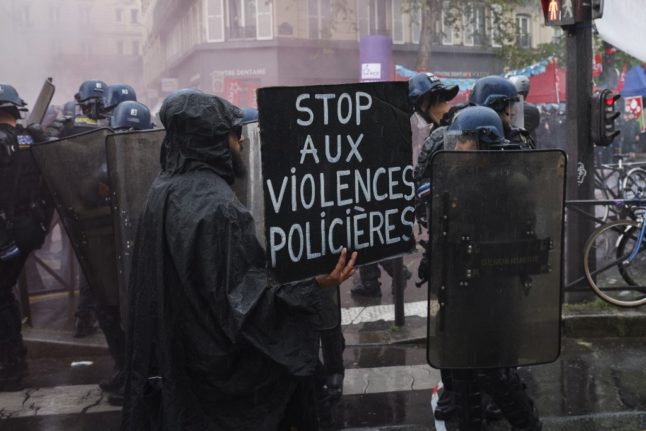What was the criticism?
A highly critical report has been published into policing of several recent protests in France.
The country has in recent months seen several high-profile protests that have ended in violence – the months of protests against pension reform, although largely peaceful, in April erupted into violence in several cities with windows smashed and fires started.
During the same period an ongoing environmental protest at Saint-Soline in western France – in opposition to a local project to create huge water storage areas – saw extreme violence on several occasions with rocks and Molotov cocktails thrown and vehicles set ablaze.
In both instances police and protesters were injured – one protester at Saint-Soline ended up in a coma after being hit by a stun grenade during violent clashes with police.
Who was criticising?
The report was first presented as ‘a UN report’ but this was later clarified as ‘a group of UN experts’.
The report was actually signed by six special rapporteurs; Clément Nyaletsossi Voulé, special rapporteur on the right to peaceful assembly and association; Pedro Arrojo-Agudo, special rapporteur on the human right to drinking water and sanitation; David R Boyd, Special Rapporteur on Human Rights and the Environment; Michael Fakhri, Special Rapporteur on the Right to Food; Mary Lawlor, Special Rapporteur on the Situation of Human Rights Defenders; Irene Khan, Special Rapporteur on the Promotion and Protection of Freedom of Opinion and Expression; and Michel Forst, Special Rapporteur on the Protection of Environmental Defenders under the Aarhus Convention.
The role of special rapporteurs is to receive and verify allegations related to their area of specialism and issue an expert opinion. However they are not paid by the UN and do not speak on behalf of the UN, carefully maintaining their independence.
They have no power to issue sanctions against France, although the publicity from their report is likely to embarrass the government.
What do they say?
The rapporteurs “expressed their concern at allegations of excessive use of force during recent demonstrations against pension reform and at Saint-Soline in France”.
They called on “the authorities to undertake a comprehensive review of their policing strategies and practices in order to allow demonstrators to voice their concerns and to facilitate the peaceful resolution of social conflicts”.
Among the more specific concerns cited were the actions of the Brav-M unit of motorcycle police in Paris during the pension protests – already the subject of an official enquiry in France after several videos surfaced of violence against protesters.
They also flag up the use of LBDs – stun grenades – at Saint-Soline.
The same group had already expressed concern about French policing methods during the ‘yellow vest’ protests of 2018/19.
Is there really a problem with policing in France?
Yes, as the report flags up, these same concerns have been raised repeatedly for decades.
France sees a lot of protests and although most are peaceful there are often violent actions from a small minority – most notoriously the ‘Black Bloc’, a loosely organised group who show up at protests with the specific intention of causing trouble.
Generally, any violence is against property – street furniture such as signs and bus shelters are smashed or set alight, shop windows are smashed and debris or bins are piled up in the streets and set alight. It all makes for dramatic news coverage. Violence against random passers-by is extremely rare, although sometimes journalists are targeted.
However, there is violence between police and protesters – and this was especially the case at Saine-Soline where police were targeted with a shower of missiles including Molotov cocktails and pétanque balls, while their vehicles were set alight.
But it’s far from being a one-way thing and there have been repeated cases of police caught on camera using unacceptable violence against protesters – and sometimes people who are not trouble-makers but who have been exercising their right to peacefully demonstrate.
VIDEO 7 times French police violence has been caught on film
In general, the concerns raised fall into two categories: firstly, police tactics including the routine use of tear gas at protests and non-lethal weapon including rubber bullets, stun grenades and flash grenades. Dozens of ‘yellow vest’ protesters lost eyes, hands or feet to these police weapons.
The second concerns the action of individual officers who have been caught on camera beating protesters. These are routinely dismissed as the actions of rogue officers, but the disciplinary process is poor and campaigners say this simply happens too often for the ‘bad apple’ defence to remain credible.
Violent policing at protests tends to attract a national or international reaction, but people living in the poorer areas of France – especially people of colour – say that violence from the police is a long-standing problem.



 Please whitelist us to continue reading.
Please whitelist us to continue reading.
Member comments